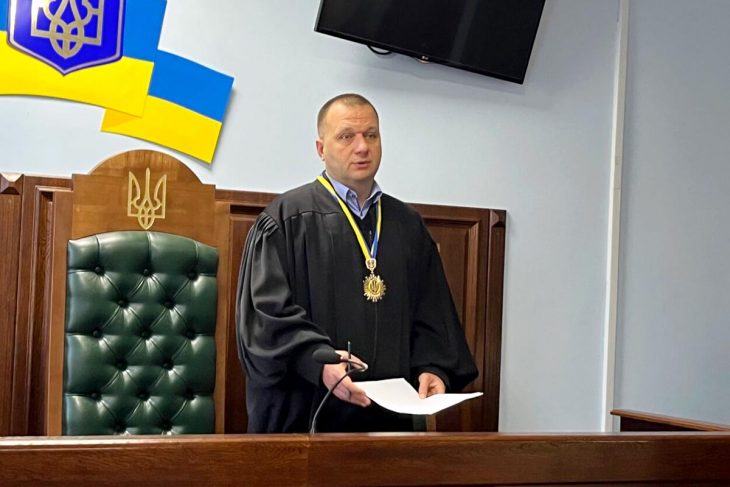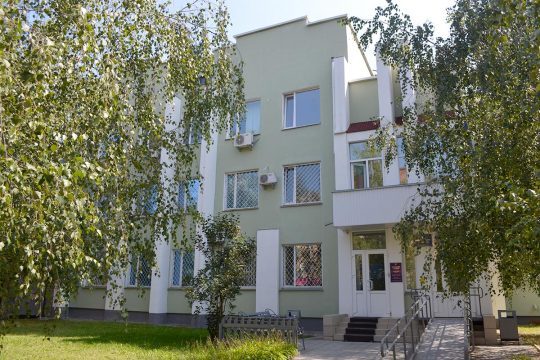On the morning of November 2, when Judge Volodymyr Pavlov began to publicly announce the decision in the trial in absentia of two Russian servicemen accused of abusing residents of an occupied village in Chernihiv region in March 2022, something hissed behind him. "Not even the wiring can withstand this sentence," joked the judge. For weeks, Russian missiles have been damaging power supply installations in Ukraine, and the participants had to move rooms so that the court session could be properly recorded on audio and video.
It took only a few minutes to read the decision because in wartime conditions judges have been allowed to read only a short summary, in other words the sentencing. Ruslan Kuliev was sentenced to the maximum possible 12 years of imprisonment, and his younger co-accused Andrii Chudin to 10 years. The full text of the judgment was to be sent to the parties later. This was the first judgment delivered by a Ukrainian court on war-related sexual violence.
Blackmailing for sex
On March 9, the village near Chernihiv was occupied by servicemen of the 80th tank regiment (military unit #87441) of the Russian Federation forces, a unit stationed in Russia in the city of Chebarkul. Thirteen of these soldiers settled in a house where an elderly woman and her grandniece and grandnephew lived.
The commander of the occupiers, 30-year-old Ruslan Kuliev, is accused of having pursued the girl who was twice younger than him for more than a week. According to the indictment, Sergeant Andrii Chudin kept the girl’s older brother, a former conscript of the National Guard, in handcuffs in the yard, forcing him to spend nights without outerwear in the freezing cold.
Kuliev allegedly beat and strangled the girl, and threatened he would kill her brother if she did not have sex with him. But he did not achieve his goal. An aunt came to help. Mrs. Natalya lives in a nearby village. The brother and sister are her nephews, and their landlady is her own mother. When the telephone connection disappeared, Natalya went to visit her family, despite the presence of the enemy army.
Natalya and her nephew testified in a closed court session on October 18. The victim girl was not interrogated in court. Only a video recording of her testimony during the pre-trial investigation was played at the hearing. After Russia’s invasion of Ukraine last February, the law was amended to allow the use of video testimony of victims and witnesses as evidence in court. This allows, among other things, to avoid re-traumatization.
“Aunt, take Masha!”
“There were more than a thousand [Russian soldiers] in the village, not counting the equipment. I was in shock,” Natalya said in an interview with Sudovyi Reporter after the trial. When she arrived at her mother’s, a soldier asked her: "Where are you going?". “I said, home. I really was going home. I brought products to them, because there was not much, and because there was no connection.”
Upon arrival, “a Russian soldier was chopping firewood. Then he followed me. He said that he would let go neither Sasha nor Masha. He would not let anyone in. I did not sleep for two nights. I promised that I would come the next day. But there was such shelling that it was impossible to go outside. [Russians] did not live in [my] village, but they robbed us. They went into houses and took food and everything they needed,” Natalya recalled.
“When I first came, Sasha's eyes filled up with tears. He said: ‘Aunt, take Masha!’. He said that the commander was after her, and he could not do anything because he was tied up. My mother interceded a couple of times, then the commander hit her so hard that she fell down and hit her head on the couch so that she lost consciousness and [had to be] doused with water.”
“We came to free you from American NATO”
When Natalya came the second time, she was in shock and cursed the soldiers. She asked who was the most senior among them. It turned out that he was “five feet tall on heels”, she said. The soldier said: "You can't go into the house. You are a scout, I will shoot you. You are a Nazi. We came to free you from American NATO.”
“Where did you see that the woman has NATO in her house?” she replied. “I go in and say to Masha and my mother: ‘Get ready!’.”
“They're not going anywhere,” said the soldier.
“How come? We are free people! You won't forbid me to take them, but who are you? Commander? Then his walkie-talkie squealed, and I heard: "Moscow" and he left the house. Then he came back and said: "Okay, now I'm good, take them away."
Later, the occupier realized his mistake [to let Masha go] and tortured the boy for his aunt's address, but got nothing.
"I would still go and pick her up today if there was such a situation,” said Natalya in the interview.
“Not proven”
The prosecutor asked for 12 years in prison for both defendants, despite the fact that their roles were different. "We believe that even 12 [years] is not enough for them for such cruelty, but the law does not allow more," said prosecutor Ihor Kondratyuk, who works in juvenile justice.
Defence lawyers Oleg Kostyuk and Mykola Kashuba asked that the Russian soldiers be acquitted. They said it had not been proven that of the 13 servicemen who seized the village house, it was Kuliev and Chudin, and not anyone else, who committed these crimes. They said that the evidence was collected illegally and dubiously. [Investigators looked for photos on social networks, not from the military and passport information databases of the Russian Federation.]
“It has not been proven in fact that Chudin is Chudin, and Kuliev is Kuliev. The questionnaire data [personal data on the accused] was not established in accordance with the requirements of criminal procedural law. It was necessary to follow the decision of an investigating judge to carry out secret investigative search actions. The permission of the court is required, and the evidence collected without such permission is illegal,” Chudin’s defence counsel Kostyuk told Sudovyi Reporter.
The starting point of the investigation was the phone number of one of the Russian occupants. The prosecutor initially said that Kuliev had "left" his phone number in the house. But later it turned out that it was the victim who wrote down the phone number of a certain "Andrei Sergeevich" on a piece of paper from a soldier's notebook while he, turning his back, was lighting the boiler. As it happened, the number belonged to the same soldier Chudin who beat the boy and kept him in handcuffs on the street for four nights. Agents [from the local prosecutor’s office] found pages linked to the phone number in social networks, and Chudin's photo was found there. When the victims recognized the Russian, the puzzle came together.
Kuliev had a chevron with his surname on his uniform while living in the victims' house. He was identified in the military unit in which Chudin served. Both victims, the brother and sister, after seeing the photo, confirmed that it was him.
"I would probably have lynched him"
In a conversation with Sudovyi Reporter, the injured boy said that he has no particular complaint against the other 11 Russians. "I can even say that most of them were correct, but they did not have the influence to help," he added.
When they left, the Russian soldiers took with them blankets, carabiners for keys, army gloves (the boy had previously served in the National Guard) and other small things. The family did not report the robbery. "The most important is that the sister is healthy. You can buy things but life and health are priceless," said the boy in an interview.
According to the court's verdict, the dark green military jacket forgotten by the Russian soldiers in a village house must be destroyed as it is not considered as evidence, while the piece of paper with the phone number remains in the case file.
War crimes have no statute of limitations. This means that Chudin and Kuliev could be tried 20 years from now. But Ukraine’s Office of the Prosecutor chose to try them now, even in the absence of the accused.
When asked how he feels about the in absentia process, the injured boy just shrugged his shoulders and admitted that it makes a strange impression.
“I would like them to bear the blame. Chudin did not touch my sister and did not particularly offend me. And here is Kuliev! Even if he is imprisoned, he will not realize his guilt. I would have probably have lynched him,” he told us outside court. When the judge asked the boy about the desired punishment, he did not dare to say how much he wanted to take revenge.
"I would [like to] wake up in the morning and realize that it was a dream," he said. To "forget about the war with Russia", and forget that Russia exists.
This report is part of a series on war crimes, produced in partnership with Ukrainian journalists. A first version of this article was published on the "Sudovyi Reporter" website. »








